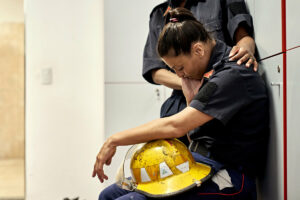In the life of an emergency responder, stress is often a constant companion. It’s not just the adrenaline of critical situations, but also the aftermath—dealing with the echoes of what you’ve seen and heard. At Guiding Light Behavioral Health in Maine, we understand that managing this stress is crucial, not only for your mental health but for your effectiveness on the job. Here are five powerful techniques to help you shield yourself from stress in your daily routine.
1. Nature Therapy: Reconnect and Recharge
For those in the demanding roles of emergency services, the healing power of nature is an invaluable resource. Whether you’re a firefighter battling blazes, a paramedic on the front lines, a police officer maintaining order, or a dispatcher coordinating crucial responses, stepping into nature can provide essential mental and physical relief.
How Nature Therapy Works:
Immersing yourself in a natural setting allows your senses to shift focus away from the pressures of work. Here’s how you can integrate nature therapy into your routine:
- Take Short Walks: Even a brief walk in a nearby park during a break or after a shift can help clear your mind and reduce stress.
- Plan Outdoor Activities: Whether it’s hiking, cycling, or simply sitting by a water body, regular outdoor activities can significantly impact your overall health by lowering cortisol levels and enhancing relaxation.
- Engage Your Senses: Pay attention to the environment—the sound of leaves rustling, the sight of greenery, the smell of fresh earth. These sensory experiences can help recalibrate your emotional state.
Why It’s Valuable:
Nature therapy is particularly effective for emergency responders due to its proven benefits in reducing stress-related hormones and promoting physical and emotional well-being. Here’s why it’s a perfect fit for your lifestyle:
- Stress Reduction: Natural environments are known to reduce stress, offering a peaceful contrast to the often chaotic and unpredictable nature of emergency work.
- Improved Mood: Regular exposure to nature can improve your mood and increase feelings of happiness and peace, crucial for those in high-stress jobs.
- Enhanced Resilience: By regularly connecting with nature, you can build emotional resilience, helping you to better cope with the daily pressures of your role.
Accessible for All Emergency Personnel:
This method of stress relief is not only beneficial for those actively on the field but also for those who support them behind the scenes. Dispatchers, administrative staff, and other support roles can also take advantage of nature therapy to manage work-related stress effectively.
Cultivating a Connection with Nature:
Incorporating nature into your life isn’t just about big adventures; it’s about finding small, everyday ways to disconnect from stress and reconnect with the world around you. This can be as simple as eating lunch outside, taking a new route home that lets you drive through a scenic area, or scheduling regular weekend outings to local parks or nature reserves.
By making nature therapy a regular part of your stress management strategy, you ensure that you’re not only surviving in your critical role but thriving. With each step outdoors, you’re taking a step towards a healthier, more balanced life, equipped to meet any challenge with renewed vigor and clarity.
2. Tactical Breathing to Regain Control
In the intense worlds of firefighting, law enforcement, emergency medical services, and other frontline positions the physical and mental demands can often lead to rapid, shallow breathing, a common response to stress that can heighten feelings of anxiety and loss of control. Tactical breathing, a method trusted by military and first responder teams, provides a practical and immediate way to manage this stress and regain composure.
How Tactical Breathing Works:
This technique focuses on controlled breathing to stabilize your heart rate and encourage a state of calm, allowing you to think more clearly during high-pressure situations. Here’s how to effectively practice tactical breathing:
- Inhale Slowly: Breathe in deeply through your nose, counting slowly to four. This slow intake of air helps reduce the fight-or-flight response, crucial for firefighters approaching a blaze or EMTs responding to a crisis.
- Hold: Keep the breath in your lungs for another count of four. This pause helps increase oxygen absorption, essential for law enforcement officers needing to remain alert during intense scenarios.
- Exhale Slowly: Release your breath smoothly through your mouth over a count of four. This helps expel the buildup of carbon dioxide and can aid in reducing the physical symptoms of stress.
- Pause: After exhaling, hold your breath again for four seconds. This final pause completes one cycle, helping to reset your autonomic nervous system.
Repeat: Continue this cycle several times. Each repetition helps to further stabilize your emotions and clarify your thoughts, empowering you to handle the immediate tasks with increased effectiveness and reduced stress.
Why It’s Valuable:
For emergency heroes, maintaining peak mental clarity is as critical as physical readiness. Tactical breathing offers a reliable and easy-to-implement tool that can be used in the midst of any stressful situation, whether waiting for a call to action or in the aftermath of an intense event. This technique not only supports your immediate psychological needs but also contributes to long-term resilience against stress-related issues.
By incorporating tactical breathing into your daily routine, you can enhance your ability to face challenges with a calm and focused mindset. For workers like firefighters, EMTs, and police officers, mastering this technique can make a significant difference in performance and overall mental health, ensuring you are always ready to serve and protect with confidence.
3. Progressive Muscle Relaxation: Ease the Tension
After hours of navigating unpredictable emergencies, the physical tension accumulated can be as debilitating as the mental strain. Progressive Muscle Relaxation (PMR) is a therapeutic practice highly effective for first responders like firefighters, EMTs, and law enforcement officers, who often endure extended periods of physical readiness and mental vigilance.
How Progressive Muscle Relaxation Works:
PMR teaches your body to recognize the difference between tension and relaxation, a critical skill for those in high-stress professions. By deliberately tensing and then relaxing each muscle group, you can significantly lower your overall stress levels and improve your ability to relax. Here’s a step-by-step guide tailored for emergency responders:
- Start at Your Toes: Tighten the muscles in your toes as much as you can, hold for a count of five, and then release all tension. Feel the warmth and heaviness of relaxation that follows.
- Work Upwards: Gradually move through each part of your body—calves, thighs, glutes, abdomen, chest, arms, and hands. For each muscle group, continue the practice of tensing and then relaxing.
- Shoulders to Neck: Often carrying the bulk of stress, focus on these areas crucial for EMTs lifting equipment or police officers wearing heavy gear. Tense these muscles tightly, hold, and then release, feeling the stress melt away.
- Facial Muscles: End with your face, where stress can manifest in furrowed brows or clenched jaws. Tense your facial muscles, hold, and then let go, smoothing out any frowns or tightness.
Why It’s Valuable:
For firefighters, EMTs, and police officers, and their support positions like dispatchers, the demands of the job can lead to chronic muscle tension, which not only affects physical health but also contributes to fatigue and stress. PMR can be especially beneficial at the end of a long shift or after a particularly stressful call, helping to break the cycle of ongoing tension and preventing the build-up of stress day after day.
Implementing PMR into your daily routine can improve your sleep quality—a vital component of mental and physical health for first responders. Better sleep enhances cognitive function and emotional resilience, equipping you to handle the intense demands of your roles more effectively.
Enhancing Your Stress Management Routine:
Incorporating PMR into regular training programs or during brief moments of downtime can offer profound benefits. By regularly practicing this technique, you can maintain a lower baseline of stress, improve your body’s response to sudden stressors, and enhance your overall well-being, ensuring you’re always prepared to perform at your best.
4. Mindfulness Meditation: A Moment of Peace
Mindfulness meditation offers a versatile and powerful tool for stress reduction, not limited to the quiet of a meditation hall but extremely effective in the bustling environments of emergency services. For first responders—whether you’re a paramedic, a firefighter, a police officer, or a dispatcher—finding moments of peace through meditation can dramatically lower stress and foster resilience in your demanding roles.
How Mindfulness Meditation Works:
This technique revolves around focusing on the present moment, primarily through attentive breathing, which helps calm the mind and reduce tension. Here’s a straightforward approach to incorporate mindfulness meditation into your busy schedule:
- Find a Quiet Spot: Even in a hectic environment, try to find a small, quiet space where you can pause for a few minutes. It could be a break room, the back of an ambulance, or even your vehicle.
- Sit Comfortably: Make sure you are in a comfortable position, either sitting on a chair, on the floor, or inside your vehicle. The key is to position yourself in a way that you can stay still for a few minutes without discomfort.
- Focus on Your Breath: Close your eyes and bring your attention to your breathing. Notice the air entering your nostrils, filling your lungs, and then slowly leaving your body. Try to make your breaths deep and slow.
- Redirect When Distracted: It’s natural for your thoughts to wander—to the call you just responded to, the paperwork waiting, or even what’s for dinner. Each time you notice your mind drifting, gently bring your focus back to your breathing.
Why It’s Valuable:
In the stress-filled roles of emergency services, mindfulness meditation acts as a mental reset button, allowing you to clear your mind of clutter and refocus on the present. This not only decreases the likelihood of burnout but also enhances your ability to make clear, strategic decisions in critical moments.
Benefits for All Emergency Responders:
Practicing mindfulness can help all members of the emergency services community, not just those on the front lines. Support staff and administrative personnel can also benefit from this practice, finding it easier to handle the daily pressures that come with supporting active field operations.
Incorporating mindfulness into daily routines can improve overall mental health, leading to better personal interactions and a more positive workplace atmosphere. Regular practice reinforces a state of mental readiness and emotional stability, helping you face the challenges of your role with renewed focus and strength.
5. Structured Journaling: Reflect and Unload
Writing isn’t just an artistic endeavor—it’s a proven stress relief tool, especially valuable in the high-stakes world of emergency response. For paramedics, police officers, firefighters, and support staff, structured journaling offers a way to systematically decompress and reflect after challenging shifts.
How Structured Journaling Works:
This method involves using specific prompts to guide your writing, helping you focus on and process the events of your day. This can be particularly helpful after a tough call or during a high-stress period. Here’s how you can start:
- Choose Your Prompts: Begin with simple, directed questions that encourage you to examine both the positive and challenging aspects of your day. Some effective prompts might include:
- What was the most challenging part of my shift?
- What did I handle well today?
- What could I improve or do differently tomorrow?
- Set Aside Time: Dedicate a few minutes at the end of your shift or before bedtime to write in your journal. Making this a routine can help turn it into a consistent outlet for stress relief.
Why It’s Valuable:
Journaling provides multiple benefits for emergency responders:
- Emotional Processing: By writing down what happened and how you felt, you externalize emotions that might otherwise remain bottled up. This can reduce the intensity of negative feelings and help prevent burnout.
- Perspective Gaining: Reflecting on the day’s events can help you see them from a new angle, often revealing solutions or positives you might have missed.
- Performance Improvement: Regularly assessing your actions and reactions allows you to recognize patterns and areas for improvement, ultimately enhancing your skills and decision-making on the job.
For All Roles Within Emergency Services:
Structured journaling isn’t just for those directly handling emergencies; it’s also beneficial for dispatchers, administrative personnel, and leadership within emergency services. It helps all staff manage the stress that comes from the demanding environment of emergency response, fostering a healthier, more reflective approach to both personal and professional challenges.
Developing a Reflective Practice:
Incorporating structured journaling into your daily routine can significantly impact your well-being and professional development. Over time, this practice can lead to a deeper understanding of your emotional and operational responses, aiding in your growth as a responder and as a person. This simple tool can make a substantial difference, providing clarity and peace in the demanding world of emergency services.
First Responders, Implementing Your Shield!
These techniques—tactical breathing, progressive muscle relaxation, mindfulness meditation, structured journaling, and nature therapy—are more than just actions. They are powerful tools designed to fortify your resilience against the relentless stresses of emergency work. By weaving these strategies into your daily routine, you do more than just cope with the demands of your profession; you enhance your ability to thrive amidst them.
Each method serves not only as a shield against stress but as a foundation for building a sustainable career in emergency services. They empower you to maintain your health and vitality, which are essential for performing the critical tasks that you face each day. When you are at your best, both physically and mentally, you are better equipped to serve those in need with strength and compassion.
A Final Message to Our Emergency Heroes
As you stand on the front lines, remember that caring for yourself is not an act of self-indulgence—it’s a necessity. Your role requires the utmost dedication, and this cannot be sustained without a commitment to your own well-being. These practices are your allies, ensuring you can continue to give your best to those who depend on you.
We at Guiding Light Behavioral Health salute your courage and your dedication. It’s because of your commitment that we are inspired to provide these resources—to support you as you support others. As you protect and care for our communities, take these tools and use them to protect and care for yourself. Remember, by fostering your own health and resilience, you are not only upholding your duty but also honoring your right to a fulfilling and healthy life.
Let these techniques be your companions on the journey, helping you navigate the challenges of your calling with confidence and peace. Your work is vital, but so is your well-being. Let us help you shield against stress so that you can continue to be the hero you are, not just for today, but for many years to come.
Reach Out and Recharge
If you feel the weight of your responsibilities bearing down, remember, you don’t have to face it alone. We at Guiding Light Behavioral Health are here to walk alongside you. Reach out to us whenever you’re ready—to talk, to learn, or just to breathe. Together, we can strengthen your resilience and renew your spirit, ensuring you continue to serve with both passion and peace. Your courage inspires us; let us support you in nurturing that courage. You’re not just our heroes; you’re valued members of the community deserving of care and attention. Let’s start this journey of self-care together.





